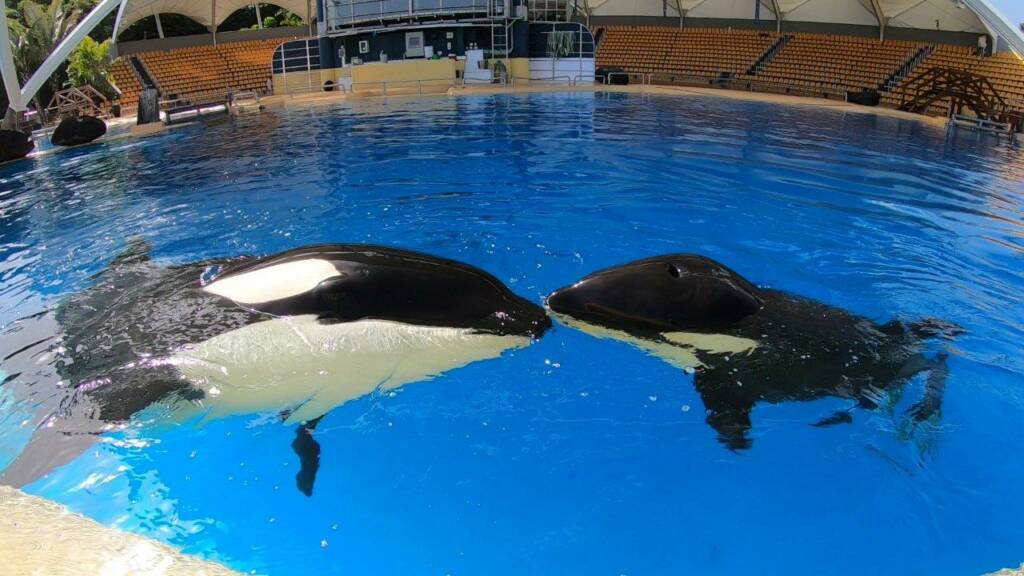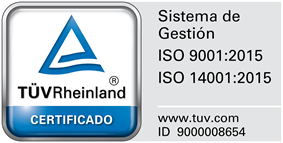
It is overwhelmingly surprising that PETA Deutschland (PETA Germany) continues to publish campaigns urging for the orca Morgan’s release. And recently they have also been demanding the same for her calf Ula, born in Loro Parque. One might think that either the representatives and activists of PETA Deutschland cannot read or simply do not understand the decisions of the courts of justice.
It has been more than proven and recognized through 10 court decisions and several confirming statements of the European Parliament’s Petitions Committee that the orca Morgan cannot be released. Therefore, the Dutch decision-makers rightfully placed her in Loro Parque in order for her to integrate into a social group of animals of her species in one of the most modern dolphinariums in the world – which, by the way, was done with great success.
Almost 10 years ago, a group of independent experts made it clear that Morgan could not be released because:
- Her family was never found. Since 2007, no one has located any group of orcas that could be potentially family-related to her.
- When Morgan was found alone, dehydrated and ill nourished, she had not spent enough time to learn hunting techniques of the Norwegian orca groups.
- Releasing her would mean a condemnation to a long agony and her inevitable death, and therefore, represent something that is not possible and absolutely contrary to what animal protection means.
- PETA’s demand for an immediate transfer of the animals to a rescue center in the sea is simply utopian, because there is no such facility in existence.
- Similarly, the return of these two animals to the sea would lead to genetic contamination; something that would surely cause a negative impact on the vitality of the wild populations of orcas.
In addition, in 2019 the results of Morgan’s second audiogram were published in a scientific journal, leaving no doubt about her being completely deaf. How can an organization that claims to defend the rights of animals propose that a deaf orca, without a family and without having learned how to hunt for food, be transferred into the rescue facility in order to be later released into the open sea? Moreover, accompanied by her two-year-old offspring, which also does not know how to hunt and cannot learn from her mother.
It is something so absurd that it could almost lead one to think that members of PETA have simply not understood the situation. However, this is not the case. They simply use every opportunity to do this type of smear campaigns to gain public attention and raise funding. Donations of the good-hearted people and animal lovers that make them in their honest conviction that these funds will be used in favor of suffering animals. However, this is not the case.
At this point, we would like to make one thing clear: our animals do not suffer! They live in spacious facilities, are cared for with utmost attention, receive first-class quality food and the best medical care, as well as daily exercise to stay physically and mentally fit and all the love and attention of their caregivers.
Now returning to the question of PETA’s donation expenditure. Of more than 10 million Euros obtained in 2019 from donations and inheritances to benefit PETA Deutschland, less than 8% was used in favor of animals. In other words and according to the data provided by the organization itself, 92 cents of every euro donated to PETA are in reality spent without being used to help a single animal! (Source: https://www.peta.de/mediadb/PETA-Wirtschaftsjahr-2018_2019-01.pdf).
Taking into consideration this horrible way of “helping’’ animals that they face when they have the bad luck of being rescued by PETA, it is almost better that members of this organization did not spend any money on funding shelters for abandoned animals.
PETA’s shelters in the United States have the highest killing rate. On average, these “rescued” animals get killed there in less than 4
8 hours. As PETA’s president and founder, Ingrid Newkirk, says quite openly, “We do not advocate right to life for animals.¨ (https://www.snopes.com/fact-check/ingrid-newkirk-quotes-peta-euthanasia/)
It is truly unfortunate for animals in need of help that an organization, like PETA, is deceiving good-willed people who really want to help. Furthermore, it is a shame that organizations that really work for animal welfare and biodiversity conservation, like Loro Parque, have to put up with these lies just because of PETA’s greed.
In 1994, Loro Parque consolidated its firm commitment to protections of animals and their natural habitats through the creation of the Loro Parque Fundación; an international non-profit organization specialized in the conservation and protection of species of parrots and marine mammals, among other animals, that are in danger of extinction.
Every year, and thanks to the financing by Loro Parque of the operational costs of the Fundación, 100% of received donations goes directly to biodiversity and nature conservation work, as well as to educational projects in situ and ex situ. Thus, “100% for nature” is not just a mere slogan, but goes much further: it is a reality. Its numbers and results speak for themselves: more than $21.5 million invested in nearly 200 projects on 5 continents and 10 species of parrots directly saved from their imminent extinction.
In addition, the Loro Parque Fundación maintains a strong commitment for the marine biodiversity of the Canary Islands and dedicates an important part of its resources to its protection through projects with the Loro Parque Fundación and the Poema del Mar aquarium.
Among many of these projects, a project that stands out is called CanBio, which is a research program financed jointly by Loro Parque and the Canary Islands Government and through which different research groups from the University of La Laguna and the University of Las Palmas de Gran Canaria study the climate change in the sea and ocean acidification and its effects on the marine biodiversity of the Canary Islands and Macaronesia, especially on cetaceans, sea turtles, sharks and rays.
However, what have organizations, like PETA, that claim to care about the welfare of animals, done? Instead of fighting the real problems that threaten the survival of many species and their natural habitats, they make a huge effort to discredit modern zoos strongly engaged in animal welfare and nature conservation that house dolphins or whales (as well as many other charismatic species of animals) with lies. All this while we are putting forth all our efforts into ensuring that the animals in our care have the best possible conditions.
And now we would like to hear once and for all: what has PETA done so far and how much funding has been invested to protect wild populations of cetaceans or any other species of animal?













